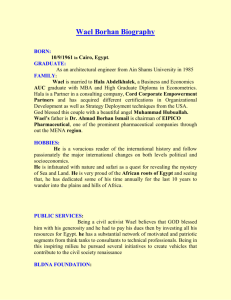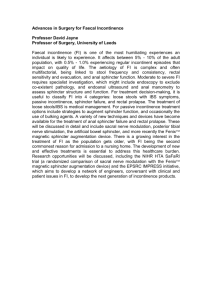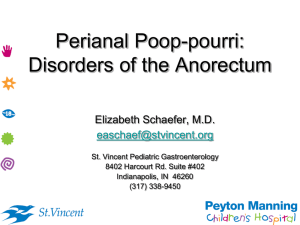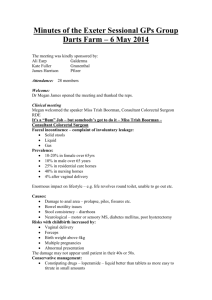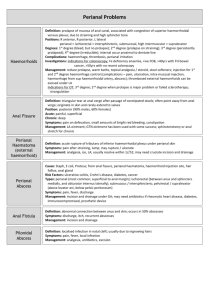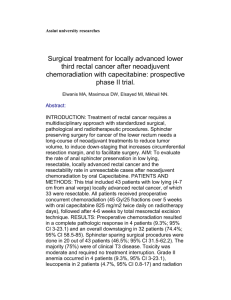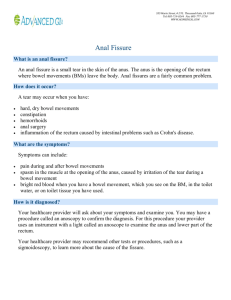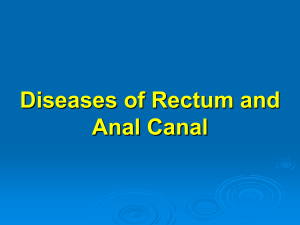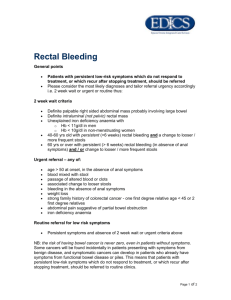benign ano ano-rectal disorders
advertisement
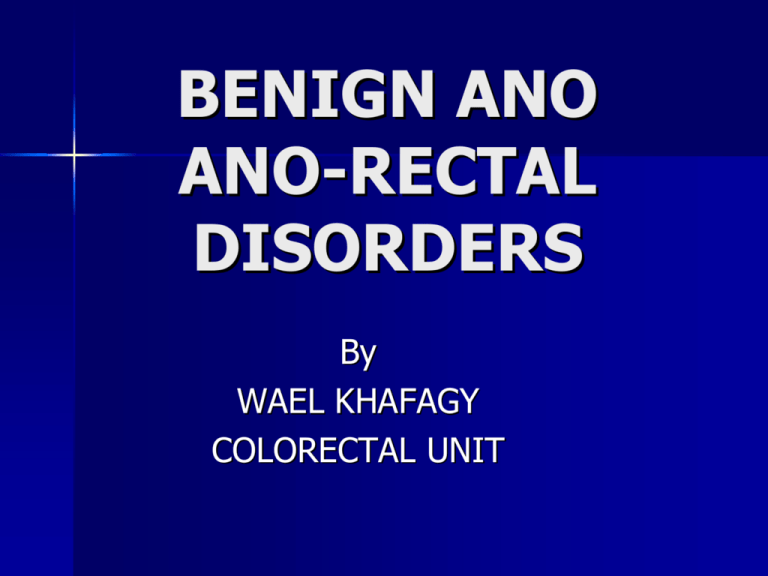
BENIGN ANO ANO ­ ­RECTAL RECTAL DISORDERS By WAEL KHAFAGY COLORECTAL UNIT
COLORECTAL UNIT Anatomy of Rectum, & Anus
Anus The origin of the rectum to the level of the third sacral vertebra. n It descends along the curvature of the n
sacrum and coccyx and ends by passing through the levator ani muscles. n The rectum differs from the colon in that n
the outer layer is entirely longitudinal muscle, characterized by the merging of the three taenia bands. It measures 12
It measures 12 –
– 15cm in length and lacks a mesentery, sacculations
sacculations , and appendices epiploicae
epiploicae .. n n
WAEL KHAFAGY The rectum describes three lateral curves: the upper and lower curves are convex to the right, and the middle is convex to the left. n n On their inner aspect these infoldings into the lumen are known as the valves of Houston. n n The rectum is divided into upper, middle, and lower thirds. 1. The upper third is covered by peritoneum anteriorly and laterally, 2. the middle third is covered only anteriorly
anteriorly , and 3. the lower third is devoid of peritoneum.
the lower third is devoid of peritoneum. n n
WAEL KHAFAGY Waldeyer
Waldeyer ’’ s Fascia n n The sacrum and coccyx are covered with a strong fascia that is p
The sacrum and coccyx are covered with a strong fascia that is p art of the parietal pelvic fascia. Known as Waldeyer
Waldeyer ’’ s fascia, this presacral fascia covers the median sacral vessels. n n The rectosacral fascia is the Waldeyer
Waldeyer ’’ s fascia from the periosteum of the fourth sacral segment to the posterior wall of the rectum. Denonvilliers
Denonvilliers ’ Fascia n n Anteriorly
Anteriorly , the extraperitoneal portion of the rectum is covered with a visceral pelvic fascia, the fascia propria Anterior to the fascia propria
propria , or is a filmy delicate layer of connective tissue known as Denonvilliers
Denonvilliers ’ fascia. n It separates the rectum from the seminal vesicles and the prost
n
It separates the rectum from the seminal vesicles and the prost ate or vagina. Lateral Ligament n n The distal rectum, which is extraperitoneal
extraperitoneal , is attached to the pelvic side wall on each side by the lateral ligament, it is composed of the pelvic WAEL KHAFAGY nerve plexus, connective tissues, and middle rectal artery (if p
nerve plexus, connective tissues, and middle rectal artery (if p resent).
resent). WAEL KHAFAGY
WAEL KHAFAGY WAEL KHAFAGY
WAEL KHAFAGY n n
n n
n n
MESORECTUM The posterior rectum is devoid of peritoneum and has no mesorectum
mesorectum . The term mesorectum is a misnomer. Total mesorectal excision implies the complete excision of all fat enclosed within the fascia propria
propria , down to the levator muscles
muscles WAEL KHAFAGY WAEL KHAFAGY
WAEL KHAFAGY Anal Canal It is about 4 cm long, and terminates at the anal verge. (This definition differs from that of the anatomist, who designates the anal canal as the part of the intestinal tract that extends from the dentate line to the anal verge). Relations n n Posteriorly the anal canal is related to its surrounding muscle and coccyx. n Laterally is the ischioanal fossa with its inferior rectal vessels n
and nerves. n Anteriorly in the male is the urethra, and in the female are n
the perineal body and posterior vaginal wall.
body and posterior vaginal wall. n n
WAEL KHAFAGY Anal Canal LINING OF CANAL n n The lining of the anal canal consists of epithelium of different types at different levels. n Dentate line. This line is approximately 2 cm from the anal ver
n
Dentate line. This line is approximately 2 cm from the anal ver ge. n n Longitudinal folds (columns of Morgagni
Morgagni ), of which there are 6 to 14, are known as the. There is a small pocket or crypt at the lower end of the folds. n These crypts are of surgical significance because foreign mater
n
These crypts are of surgical significance because foreign mater ial may become lodged in them, obstructing the ducts of the anal glands and possibly resulting in sepsis.
possibly resulting in sepsis. WAEL KHAFAGY MUSCLES OF THE ANORECTAL REGION INTERNAL SPHINCTER MUSCLE n n It is the downward continuation of the circular, smooth muscle of the rectum becomes thickened and rounded at its lower end. CONJOINED LONGITUDINAL MUSCLE n n At the level of the anorectal ring, the longitudinal muscle coat of the rectum is joined by fibers of the levator ani and puborectalis muscles. The conjoined longitudinal muscle so formed descends between the internal and external anal sphincters
between the internal and external anal sphincters WAEL KHAFAGY MUSCLES OF THE ANORECTAL REGION EXTERNAL SPHINCTER MUSCLE n n
1. 2. 3. It is consists of three divisions: the subcutaneous, superficia
It is consists of three divisions: the subcutaneous, superficia l, and deep portions. The lowest part (subcutaneous fibers) is attached to the skin. The next portion (superficial) is attached to the coccyx by a anococcygealligament
anococcygealligament . The deep portion of the external sphincter becomes continuous with the puborectalis muscle. Anteriorly
Anteriorly , the high fibers of the external sphincter are inserted into the perineal body, where some merge and are continuous with the transverse perineal muscles. The female sphincter has a natural defect occurring along its anterior length. The external sphincter is supplied by the inferior rectal nerve and WAEL KHAFAGY a perineal branch of the fourth sacral nerve.
branch of the fourth sacral nerve. WAEL KHAFAGY
WAEL KHAFAGY INNERVATION Sympathetic Innervation n n The sympathetic fibers to the rectum are derived from L1
The sympathetic fibers to the rectum are derived from L1 ­­ 3, which pass through the sympathetic chains and leave as a lumbar sympathetic nerve that joins the preaortic plexus. n n The aortic plexus → two hypogastric nerves identified at the sacral promontory. n n The hypogastric nerve on each side joins the branches of the sacral parasympathetic nerves, or nervi erigentes
erigentes , to form the pelvic plexus. Parasympathetic Innervation n n The parasympathetic nerve supply is from the nervi erigentes
erigentes , which originate from 2 nd ,3 rd ,&4 th sacral nerves on either side of the anterior sacral foramina. The third sacral nerve is the largest of the three and is the major contributor.
largest of the three and is the major contributor. WAEL KHAFAGY The pelvic plexus n n It supplies the prostate, seminal vesicles, corpora cavernosa
cavernosa , terminal parts of vasa deferentia,prostatic and membranous urethra, ejaculatory ducts. n n The pelvic plexus also provides visceral branches that innervate the bladder, ureters
ureters , seminal vesicles, prostate, rectum, and corpora cavernosa
cavernosa . n n In addition, branches that contain somatic motor axons travel through the pelvic plexus to supply the levator ani
ani , coccygeus
coccygeus , and striated urethral musculature. n n The branches of the pelvic plexus along with the blood vessels (neurovascular bundle) that supply WAEL KHAFAGY the male genital organs. Pudendal Nerve The pudendal nerve arises from the sacral plexus (S2 to S4). It leaves the pelvis through the greater sciatic foramen, crosses the ischial spine, and continues in the pudendal canal (
canal ( Alcock
Alcock ’’ s canal) toward the ischial tuberosity in the lateral wall of the ischioanal fossa on each side. Three branches are the inferior rectal, perineal
perineal , and dorsal nerves of the penis or clitoris.
clitoris. n n
WAEL KHAFAGY ANAL CANAL Motor Innervation n n The internal anal sphincter is supplied by both sympathetic and parasympathetic nerves. n n The external sphincter is supplied by the inferior rectal branch of the internal pudendal nerve and the perineal branch of the fourth sacral nerve. Sensory Innervation n n The sensory nerve supply of the anal canal is the inferior rectal nerve. The epithelium of the anal canal is profusely innervated with sensory nerve endings, especially in the vicinity of the dentate line. n n Pain sensation in the anal canal can be felt from WAEL KHAFAGY the anal verge to 1.5cm proximal to the dentate line. The anal canal can sense touch, cold, and PATIENT HISTORY n n
n n
n n
n n
n n
n n
n n
n n
n n
n n
n n
n n
Bleeding per Anus Pain Discharge Perianal Swelling Pruritus Prolapse Incontinence Loss of Weight Change in the bowel habit (constipation, obstruction, diarrhea, tensemus
tensemus , dyschazia
dyschazia ) Medications (laxative
Medications (laxative …
… ..
.. ect
ect ) Family History (
Family History ( familal polyposis
polyposis , colorectal cancer, Bleeding tendency
Bleeding tendency WAEL KHAFAGY EXAMINATION ANORECTAL EXAMINATION 1
1 ­­ Positioning Inverted prone jackknife position, or left lateral position 2
2 ­ Inspection Inspection should precede any other examination, Skin tags, excoriation, and change in color or thickness of the anal verge and perianal skin can be detected quickly. A scarred, patulous, or irregular
skin can be detected quickly. A scarred, patulous, or irregular ly shaped anus may give clues to the cause of anal incontinence. Particularly in multiparous women, the anal verge may be pushed down too far during straining
too far during straining — a feature of the perineal descent syndrome. 3
3 ­ Prolapse of the rectum is best demonstrated by asking the patient to strain while in a lateral position or sitting on the toilet. 4
4 ­ When the anal verge is pricked with a needle, the external s
When the anal verge is pricked with a needle, the external s phincter visibly contracts because of anal reflex. It is useful for testi
visibly contracts because of anal reflex. It is useful for testi ng the sensibility of the anal canal, which may be absent in areas of a previous scar or defect, or in patients with an underlying neuropathy.
scar or defect, or in patients with an underlying neuropathy. WAEL KHAFAGY EXAMINATION n n
n n
n n
n n
n n
n n
n n
n n
n n
Digital Examination The index finger should be well lubricated with a lubricant jell
The index finger should be well lubricated with a lubricant jell y, and the finger pressed on the anal aperture to ‘‘‘‘ warn
warn ’’ the patient. Then the finger should be gradually inserted and swept all around the anal canal to detect any mass or induration
induration . In men the prostate should be felt. In women the posterior vaginal wall should be pushed anteriorly to detect any evidence of a rectocele
rectocele . Anal tone, whether tight or loose, can be easily estimated. A stricture or narrowing from scarring or a defect in the intern
A stricture or narrowing from scarring or a defect in the intern al or external sphincters from a previous operation can be felt. A fib
external sphincters from a previous operation can be felt. A fib rous cord or induration in the anal area and anal canal may indicate a fistulous track. The external sphincter, puborectalis
puborectalis , and levator ani muscles can also be appreciated by digital examination. The finger should press gently on these muscles for signs of ten
The finger should press gently on these muscles for signs of ten derness. When a person with good sphincter function is asked to contract the muscles, the examiner not only feels the squeeze of the muscle o
muscles, the examiner not only feels the squeeze of the muscle o n the WAEL KHAFAGY examining finger but also feels the finger pulled forward by the puborectalis muscle.
muscle. Endoscopy n n Anoscope n n Sigmoidoscopy It is an essential part of examination of all patients with colorectal disorders (75% of colorectal cancer occurs within this area) n n Colonoscopy (Diagnostic and therapeutic) n n Capsule Endoscopy
Endoscopy WAEL KHAFAGY Manometry and EMG studies n n
n n
n n
n n
n n
n n
n n
Anorectal manometry is a means of quantifying the function of the internal and external sphincters
function of the internal and external sphincters . {Closed balloon systems and perfused fluid
fluid ­­ filled open
filled open ­­ tipped catheters. Air
catheters. Air ­­ filled balloon systems,& air
filled balloon systems,& air ­­ filled microballoon manometry (( cmputerized
cmputerized )}. The length of the high
The length of the high ­­ pressure zone varies between 2.5 and 5 cm and is shorter in women than in men. maximal resting anal pressure (MRAP will range from 65 – 85mmHg , no difference in both sexes) maximal squeeze anal pressure (MSAP 183 mmHg in men &. 102 mmHg in women). Rectoinhibitory anal reflex
reflex The internal sphincter reflex in response to rectal distention can be elicited by inflation of a rectal balloon. Balloon Expulsion Test WAEL KHAFAGY Saline Continence Test
Saline Continence Test Radiological n n
n n
n n
n n
n n
n n
n n
n n
n n
n n
n n
Endo
Endo ­­ rectal US Barium Enema Defecography It is measure the anorectal angle. 92
angle. 92 ±
± 1.5 at rest and 137
rest and 137 ±
± 1.5 during straining, perineal descent, the presence of a rectocele
rectocele ,& intussception & anismus Fisulography Colonic Transit Studies Abdominal and pelvic US CT, MRI Computed Tomographycolonography (CTC) (virtual colonoscopy) 99mTc
99mTc ­­ Labeled Red Blood Cells Positron Emission Tomography Radioimmunoscintigraphy
Radioimmunoscintigraphy WAEL KHAFAGY Laboratory OCCULT BLOOD TESTING n n Guaiac Test n n Heme
Heme ­­ Porphyrin Assays n n Immunologic Test Assessment of Operative Risk n n Cardiovascular Status n n Pulmonary Function n n Renal Status n n Hepatic Function n n Hematologic Status, n n Nutritional Status,
Nutritional Status, WAEL KHAFAGY WAEL KHAFAGY
WAEL KHAFAGY HEAMORRHOIDS
HEAMORRHOIDS n n
n n
n n
n n
n n
n n
Hemorrhoids are not varicose veins, and not every one has hemorrhoids. But everybody has anal cushions. The anal cushions are composed of blood vessels, smooth muscle (
smooth muscle ( Treitz
Treitz ’’ s muscle), and elastic connective tissue in the submucosa They are located in the upper anal canal, from the dentate line to the anorectal ring (
ring ( puborectalis muscle). Three cushions lie in the following constant sites: left lateral, right anterolateral
anterolateral , and right posterolatera
posterolatera WAEL KHAFAGY WAEL KHAFAGY
WAEL KHAFAGY Theories of hemorrhoids Varicose Theory obslete n n Vascular hyperplasia Theory obselete n n It is sliding downward of the anal cushions. n n Disruption of the anchoring and flattening action of the musculus submucosae ani (( Treitz
Treitz ’’ s muscle). n n Hypertrophy and congestion of the vascular tissue are secondary. n n Hemorrhoids are associated with straining and with an irregular bowel habit, a feature compatible with the sliding anal lining theory. n n Hard, bulky stools as well as tenesmus from diarrhea cause straining, which is more likely to push the cushions out of the anal canal.
likely to push the cushions out of the anal canal. WAEL KHAFAGY n n
Aetiology n n Chronic constipation has been considered the cause of hemorrhoids, n n Other studies show that patients with hemorrhoids are not necessarily constipated but tend to have abnormal anal pressure. n n Pregnancy hormonal changes, n n Portal hypertension
Portal hypertension WAEL KHAFAGY PATHOLOGY n n
n n
1. 2. 3. 4. External hemorrhoids comprise the dilated vascular plexus that is located below the dentate line and covered by squamous epithelium. Internal hemorrhoids can be divided into categories. Grade 1 internal hemorrhoids are those that bulge into the lumen of the anal canal and may produce painless bleeding. Grade 2 internal hemorrhoids are those that protrude at the time of a bowel movement but reduce spontaneously. Grade 3 internal hemorrhoids are those that protrude spontaneously or at the time of a bowel movement and require manual replacement. Grade 4 internal hemorrhoids are those that are permanently prolapsed.
permanently prolapsed. WAEL KHAFAGY CLINICAL n n
n n
n n
n n
n n
Bleeding Mucosal prolapse Chronic states of prolapse predispose to mucous and fecal leakage, resulting in pruritus and excoriation of the perianal skin. Pain per se is not a symptom of uncomplicated hemorrhoids. It may indicate associated disease, such as anal fissure, perianal abscess. Prolapsed, strangulated hemorrhoids present as an acute problem, with the symptom of pain associated with discharging, edematous, tender, irreducible hemorrhoids. Gangrene and infection with sloughing and secondary bleeding
with sloughing and secondary bleeding WAEL KHAFAGY Examination n n
n n
n n
n n
n n
n n
n n
Inspection may reveal variable degrees of perianal skin abnormalities, protrusion of internal hemorrhoids, or normal appearance. Straining P.R. Asking the patient to strain while the examiner
examiner ’’ s index finger is in the anorectum
anorectum , an enterocele can be detected. rectal and anal canal neoplasms and will enable assessment of the tone of the anal sphincter. Anoscopy is performed to rule out a coexisting anal fissure. Sigmoidescopy Colonscopy
Colonscopy WAEL KHAFAGY TREATMENT n n
n n
1. 2. 3. 4. 5. DIET AND BULK
DIET AND BULK ­­ FORMING AGENTS OFFICE, OUTPATIENT, AND MINOR PROCEDURES Rubber Band Ligation Infrared Photocoagulation Electrocoagulation Sclerotherapy Cryotherapy
Cryotherapy WAEL KHAFAGY n n
n n
n n
1. 2. 3. 4. 5. 6. Anal Stretch Lateral Internal Sphincterotomy Hemorrhoidectomy Closed hemorrhoidectomy Excision and Ligation Laser Hemorrhoidectomy PPH Ligature Harmonic scalpel
Harmonic scalpel WAEL KHAFAGY WAEL KHAFAGY
WAEL KHAFAGY FISSURE
FISSURE Definition:
Definition: ­ A fissure
A fissure ­­ in
in ­­ ano is a painful linear ulcer situated in the anal canal and extending from just below the dentate line to the margin of the anus. n n In the acute phase, the lesion is often a crack in the epithelial surface but causes much pain and spasm.
causes much pain and spasm. WAEL KHAFAGY n n Affects both sex equally (women, 51.1%; men, 49.9%). n n Posterior fissure in 73.5%, the anterior in 16.4%, and in both in 2.6%. n n Anterior midline in 45% of women and 15% of men.
15% of men. WAEL KHAFAGY PATHOGENESIS rectal distention →→ reflex relaxation of the internal sphincter. n n In patients with anal fissures, this relaxationis followed by an abnormal ‘‘‘‘ overshoot
overshoot ’’ contraction
contraction → sphincter spasm and pain during defecation. n n Lateral internal sphincterotomy → the pressure dropped by 50% to normal levels and the fissures healed with no change in pressure over a 12
pressure over a 12 ­­ month follow
month follow ­­ up.
up. n n
WAEL KHAFAGY PATHOGENESIS n n The vessels passing through the sphincter muscle are subject to contusion during periods of increased sphincter tone and that the resulting decrease in blood supply might lead to a pathogenetically relevant ischemia at the posterior commissure
commissure .. WAEL KHAFAGY DIAGNOSIS n n Inspection :: ­ Gentle separation of the buttocks usually reveals the fissure; however, spasm may keep the anal orifice closed, and the finding of spasm of a sphincter is suggestive of a fissure. n n The coexistence of large hemorrhoids or skin folds may hide the ulcer. n n The triad of a chronic fissure includes a sentinel pile, an anal ulcer, and a hypertrophied anal papilla, with the sentinel n n
WAEL KHAFAGY DIAGNOSIS n n Palpation The digital examination is uncomfortable, with maximal tenderness usually elicited . n n In fact, the pain may be so intense that a complete digital examination cannot be performed during the initial examination. However, it is essential that the examination be performed later to exclude other lesions of the lower rectum such as carcinoma or a polyp. n n With a chronic fissure, induration of the base and the lateral edges, as well as a hypertrophied anal papilla, may be palpable.
papilla, may be palpable. n n
WAEL KHAFAGY Anoscopy n n
n n
n n
n n
n n
With an acute fissure, anoscopic examination is usually impossible because of the severe pain. With a chronic fissure, the ulcer itself will be noted as a triangular
as a triangular ­ shaped slit in the anal canal, with the floor being the internal sphincter. Just proximal to the ulcer, the hypertrophied anal papilla may be identified. A chronic fissure may be associated with anal stenosis of varying severity, Anoscopy may also demonstrate other conditions such as internal hemorrhoids or proctitis
proctitis .. WAEL KHAFAGY DIAGNOSIS n n A biopsy should be performed on any fissure that fails to heal after treatment. n n Such biopsy may reveal unsuspected Crohn
Crohn ’’ s disease or an implanted adenocarcinoma
adenocarcinoma . n n Squamous carcinoma of the anal canal may be confused with fissure
may be confused with fissure ­­ in
in ­­ ano
ano .. WAEL KHAFAGY DIFFERENTIAL DIAGNOSIS 1. 2. 3. 4. 5. 6. ANORECTAL SUPPURATION PRURITUS ANI FISSURES IN INFLAMMATORY BOWEL DISEASE CARCINOMA OF ANUS SPECIFIC INFECTIOUS PERIANAL CONDITIONS HEMATOLOGIC CONDITIONS
HEMATOLOGIC CONDITIONS WAEL KHAFAGY Fissure
Fissure ­­ in
in ­­ Ano vs. Anal Abrasion Fissure Abrasion ـــــــــــــــــــــــــــــــــــــــــــــــــــ ــــــــــــــــــــــــــــــــــــــــــــــــــــــــــــــــ Deep ulcer Superficial ulcer Sentinel pile No sentinel pile Anal papilla No anal papilla Overhanging edges Flat edges Associated scarring No associated scarring Rarely lateral May be lateral Chronic condition Transient condition (1
(1 –
– 2 d) Often treated surgically Not treated surgically
Often treated surgically Not treated surgically WAEL KHAFAGY TREATMENT ACUTE FISSURE n The aim of treatment of an acute fissure
n
The aim of treatment of an acute fissure ­­ in
in ­­ ano is to break the cycle of a hard stool, pain, and reflex spasm. n Avoidance of constipation by ingestion of bulk
n
Avoidance of constipation by ingestion of bulk ­­ forming foods. n simple measures such as warm baths n
n Anesthetic ointments n
n suppositories that contain anesthetics, analgesics, n
astringents, anti
astringents, anti ­­ inflammatory agents (usually hydrocortisone), n Nitroglycerin GTN n
n Calcium channel blocker e.g. Diltiazem
n
Diltiazem , Nifedipine n Botulinum Toxin (BT) n
n Sympathetic Neuromodulators
n
Neuromodulators . n Surgery:
n
Surgery: ­ Dilatation
Dilatation WAEL KHAFAGY CHRONIC FISSURE n n
n n
n n
n n
n n
n n
n n
Fissure that persists for at least 6
Fissure that persists for at least 6 –
– 8 weeks. Pathologic anatomic point of view features of chronicity include exposure of the internal sphincter, induration of the fissure edges, development of a large sentinel pile, and hypertrophied anal papilla. Classic Excisionwith division of varying amounts of sphincter muscle V
V ­­ Y Anoplasty (Advancement Flap Technique) Internal Sphincterotomydivision of the lower half of the internal sphincter in the posterior midline (incontinence due to the ‘‘‘‘ keyhole
keyhole ’’ deformity created by a posterior internal sphincterotomy
sphincterotomy ). Lateral sphincterotomy ( open or closed) Tailored lateral sphincterotomy in female
in female WAEL KHAFAGY Fissurectomy
WAEL KHAFAGY V­Y anoplasty. Prone position
WAEL KHAFAGY Anal Fistula
Anal Fistula n n Definition: It is an opening between perianal skin and the cavity of the anal canal or rectum.
of the anal canal or rectum. WAEL KHAFAGY WAEL KHAFAGY
WAEL KHAFAGY The spaces of the anus and rectum. 1. Pelvirectal space. 2, Ischioanal (ischiorectal) space. 3, Intersphincteric spaces. 4, Subcutaneous space. 5, Central space. 6, Submucous space .
WAEL KHAFAGY n n Different theories were reported about persistence of fistula in
persistence of fistula in ­­ ano include: 1
1 ­ Cryptoglandular theory 2
2 ­ Epethialisation 3
3 ­ Presence of foreign body: 4
4 ­ Specific infections: (IBD, TB,
Specific infections: (IBD, TB, WAEL KHAFAGY Diagram showing the possible courses of spread of sepsis from the diseased anal gland in the intersphincteric space.
WAEL KHAFAGY Classification of anal fistula n n
1. 2. According to the site of their internal opening they can be classified into: Low ­­ level fistula
level fistula , the internal opening open into the anal canal below the anorectal ring. High
High ­ level fistula
level fistula , the internal opening open into the anal canal at or above the anorectal ring .
ring . WAEL KHAFAGY Classification of anal fistula According to the relation to external and internal sphincters Parks classified fistulas into: – Intersphincteric fistula, originates from abscess in intersphincteric anal gland and runs between internal and external sphincters along the plane of longitudinal muscle fibers. – Transsphincteric fistula have a primary track that passes through the external sphincter at varying levels into the ischiorectal fossa Such fistula may be uncomplicated, consisting only of the primary track, or may have a blind high track which may terminates below or above the levator ani muscles. – Suprasphincteric fistula have a primary track running up to a level above puborectalis and then curl down through the levators and ischiorectal fossa to reach the skin. WAEL KHAFAGY – Extrasphincteric fistula run without relation to Diagram demonstrating the three planes in which sepsis may spread circumferentially.
WAEL KHAFAGY Parks (1976) classification Intersphincteric fistula. The tract passes through the internal sphincter and in the intersphincteric plane Transsphincteric fistula. The tract passes through both the internal and external sphincters, into the ischiorectal WAEL KHAFAGY fossa, and to the skin
Suprasphincteric fistula. The tract courses above the puborectalis muscle after initially passing cephalad as an intersphincteric fistula. It then traverses downward through the ischiorectal fossa to the skin
WAEL KHAFAGY Transsphincteric fistula with supralevator extension. Drainage of the extension into the rectum is contraindicated Extrasphincteric fistula. The internal opening is above the level of the levator ani muscle, and the tract passes to the skin deep to the external sphincter WAEL KHAFAGY in the ischiorectal space
Examination Examination of Anal fistulas involves five essential points: 1. The location of external opening. 2. The location of internal opening. 3. The course of primary track. 4. The presence of secondary extension. 5. The presence of other diseases complicating the fistula.
complicating the fistula. WAEL KHAFAGY Examination n n
n n
1. 2. 3. 4. 5. Digital assessment of the primary track by expert proctologist is about 85% accurate. Examination under anesthesia is considered as a routine examination of anal fistula. It is carried by proctoscope so internal opening can be seen easily (as dimpling or as scar tissue if the opening is not patent) Gentle downward retraction of the dentate line which may expose openings hidden by prominent valves or papillae. Digital massage of the track may reveal the site of the internal opening as a bead of pus. A probe can be used through the entire length of the track and must inserted gently to avoid false passage. Introduce certain agents through the track as saline, WAEL KHAFAGY hydrogen peroxide and dyes such as methylene blue and The location of external opening and its distance from anal verge and their relations to the course of the track were hypothesized by Goodsall and known as Goodsall’s rule. It states that if an imaginary transverse line bisects the anus, external opening anterior to the line will connect to an internal opening by a short, direct fistulous track. External opening posterior to the line will join tracts that curve toward an internal opening in the posterior midline (Goodsall and Miles 1990).
WAEL KHAFAGY Goodsall’s rule. The usual relationship of primary and secondary fistula orifices is diagrammed. The internal (primary orifice) is marked. A, The rule predicts that if a line is drawn transversely across the anus, an external opening (B) Anterior to this line will lead to a straight radial tract, whereas an external opening that lies posterior to the line will lead to a curved tract and an internal opening in the posterior WAEL KHAFAGY commissure. The long anterior fistula is an exception to the rule.
Exception to this rule include anteriorly located opening more than 3 cm from anal verge, which usually opens in the posterior midline and may be anterior extension of posterior horseshoe fistula. Other exception is fistula associated with other diseases especially disease and malignancy.
WAEL KHAFAGY Crohn’s Anterioposterior view fistulography showing fistulas tract non branching opening in the anal canal below the intertrochantric line.
WAEL KHAFAGY 2) Anorectal Ultrasonography 3) MRI
WAEL KHAFAGY WAEL KHAFAGY
WAEL KHAFAGY A A B B C Coronal view (STIR) left transsphincteric active track is seen start from the ischiorectal fossa traversing the external and then the internal sphincter. (A) Puborectales muscle, (B) Active transsphincteric track, (C) Ischiorectal fossa abscess cavity.
WAEL KHAFAGY Introduction
Anal manometry: Anal manometry is not a routine method for evaluating anal fistula. WAEL KHAFAGY Treatment Principles of fistula surgery: Treatment of fistulas is aimed at draining sepsis, defining and eradicating fistulous tracts whilst preserving sphincter integrity and function (Gordon, 1999). Fistulotomy and drainage: Fistulotomy means laying open and allowing to heal by secondary intention. It should be used only when a significant degree of incontinence would not result. Intersphincteric and low transsphincteric tracks are probably best treated WAEL KHAFAGY by this method.
Introduction
Fistulectomy and coring out: Fistulectomy means to excises rather than to incise the fistula track. It has advantage of low rate of recurrence but it leads to greater tissue loss with delayed healing and more risk of incontinence (Kronborg, 1985). Setons: A seton is used as a drain for the primary track, but use of the seton to transect the muscle carries a significant risk of incontinence Setons may be classified as loose, tight or chemical according to their different properties and modes of action (Fleshman et al., 1999). WAEL KHAFAGY The critical aspects of management by the cutting seton must first be getting rid of acute sepsis before sphincter division and secondly the speed with which the seton cuts through the sphincter (Peter and Robin, 2001). Advancement flaps: The rectal advancement flap achieves healing of the fistula in a shorter time, & avoiding any sphincter division.
WAEL KHAFAGY Introduction V­Y apanoplasty (Gordon, 2007)
WAEL KHAFAGY External opening of anal fisulta.
WAEL KHAFAGY Detection of the internal opening by hydrogen peroxide injection.
WAEL KHAFAGY Probing of the anal fisulta.
WAEL KHAFAGY Coring fistulectomy with saving the external sphincter.
WAEL KHAFAGY Application of seton.
WAEL KHAFAGY Appearance of the puborectalis muscle with external sphincter.
WAEL KHAFAGY Tightening of the seton around sphincter complex.
WAEL KHAFAGY REROUTING IN THE TREATMENT OF ANAL FISTULA
FISTULA External opening of the anal fistula.
WAEL KHAFAGY Detection of the internal opening (diseased crypt) using hydrogen peroxide injection.
WAEL KHAFAGY Coring fistulectomy
WAEL KHAFAGY Continuing coring fistulectomy.
WAEL KHAFAGY Continuing coring fistulectomy.
WAEL KHAFAGY Fistula rerouting by application of seton around internal sphincter.
WAEL KHAFAGY Meticulous Repair of fistulous opening in the external sphincter
WAEL KHAFAGY The appearance of the external sphincter repair
WAEL KHAFAGY Final step in rerouting technique of fistula
WAEL KHAFAGY PILONIDAL SINUS
PILONIDAL SINUS WAEL KHAFAGY
WAEL KHAFAGY n n The term ‘‘
‘‘ pilonidal sinus
sinus ’’ (( pilus
pilus , meaning hair, and nidus
nidus , meaning nest) to describe the chronic sinus containing hair and found between the buttocks. n n It is called ‘‘
‘‘ jeep disease
jeep disease ’’ because it is more frequent in military personnel who entered training & driving trucks, tanks, and jeeps.
tanks, and jeeps. WAEL KHAFAGY n n Pilonidal sinus is a chronic subcutaneous abscess in the natal cleft, which spontaneously drains through the openings.
through the openings. WAEL KHAFAGY Aetiology n n
n n
The congenital theory, the remnant of the medullary canal, and the infolding of the surface epithelium. In the modern era, the congenital theory still has its proponents. reasoned that hairs in the pilonidal sinuses are identical in length, diameter, color, and orientation. The acquired theory is now widely accepted. The affected hair follicles become distended with keratin and subsequently infected, leading to folliculitis and the formation of an abscess that extends down into the subcutaneous fat.
the subcutaneous fat. WAEL KHAFAGY n n Karydakis
Karydakis , believes that the shaft of loose hair inserts into the depth of the natal cleft in the midline of sacrococcygeal area . Once one hair inserts successfully, other hairs can insert more easily. Foreign body tissue reaction and infection follow, and the primary sinus of pilonidal disease forms.
forms. WAEL KHAFAGY Patholgy It is subcutaneous fibrous tract that may be lined with squamous epithelium. A small abscess cavity and branching tracts may come off the primary tract. As a rule, hair follicles are not identified. n n Hairs, if seen, sticking out of the secondary opening are in the abscess cavity that the body tries to spit out. n n Most sinus tracts (93%) run cephalad
cephalad ; the rest (7%) run caudad
caudad .. n n
WAEL KHAFAGY PILONIDAL ABSCESS n n
n n
n n
n n
Midline wound in the intergluteal cleft heals poorly and slowly. Drainage of a pilonidal abscess almost always can be performed with the patient under local anesthesia in the clinic, office, or emergency room. A longitudinal incision is made lateral to the midline in the coccygeal area from the wound. The hairs around the wound should be shaved for at least a couple of months.
shaved for at least a couple of months. WAEL KHAFAGY PILONIDAL SINUS Treatment of pilonidal sinus can be done in one of several ways: 1. Nonoperative treatment, 2. Lateral incision and excision of midline pits, incision and marsupialization
marsupialization , 3. Wide local excision with or without primary closure, excision and aa ­ Z
Z ­­ plasty,or b
b ­ advancing flap operation (( Karydakis procedure).
procedure). WAEL KHAFAGY Nonoperative Treatment n n Complete healing after drainage of abscess and curretage
curretage . n n Shaving all hairs within the natal cleft, 5 cm from the anus to the presacrum
presacrum . n n Injecting phenol into the sinus (60%)
(60%) WAEL KHAFAGY Lateral Incision and Lay Open of Midline Sinus Tracts n n
n n
n n
n n
n n
Excision of the midline pits, although small, frequently is slow to heal. to this unhealed draining site. The operation was performed in the clinic under local anesthesia without sedation. The patient washed the wound at shower and lightly packed it with mesh gauze once or twice daily. Hypertrophic granulation signifies improper packing and requires cauterization with silver nitrate sticks. The packing should not be tight but the mesh gauze should touch on the entire subcutaneous WAEL KHAFAGY wound.
wound. Excision and Z ­ ­ Plasty Advantage:
Advantage: ­ It Fills out and flattens the natal crease, 2. directs the hair points away from the midline, 3. largely prevents maceration, 4. reduces suction effects in the soft tissues of the buttocks, and 5. minimizes friction between their adjacent surfaces.
minimizes friction between their adjacent surfaces. 1. WAEL KHAFAGY WAEL KHAFAGY
WAEL KHAFAGY Excision and Z ­ ­ Plasty n n The excision is carried down to the subcutaneous tissue. The limbs of the Z are cut to form a 30 angle with the long axis of the wound. n n Subcutaneous skin flaps are raised, and the flaps are transposed and sutured n n A closed suction drain is placed under the full
the full ­­ thickness flaps. Z
thickness flaps. Z ­­ plasty thus avoids the midline wound, which is the main cause of slow healing and recurrences.
recurrences. WAEL KHAFAGY Advancing Flap Operation Karydakis Procedure n n
n n
n n
n n
A ‘‘
‘‘ semilateral
semilateral ’’ excision is made over the sinuses all the way down to the presacral fascia. Mobilization is carried to the opposite side so that the entire flap can be advanced toward the other side on closure. A closed suction drain is placed. This technique avoids the midline wound.
This technique avoids the midline wound. WAEL KHAFAGY WAEL KHAFAGY
WAEL KHAFAGY Rhomboid Excision with Transposition of Flap n n
n n
n n
n n
n n
A rhomboid is outlined to encompass the pilonidal sinuses in the midline. The rhomboid excision is made down to the sacral periosteum in the midline and to the gluteal fascia laterally. The flap is then transposed to cover the rhomboid wound. A suction drain is placed under the flap and the wound is closed with sutures The advantage of rhomboid excision with transposition of flap is appealing because it is easy to perform and the results are as good as any other more complicated flaps.
results are as good as any other more complicated flaps. WAEL KHAFAGY WAEL KHAFAGY
WAEL KHAFAGY GLUTEUS MAXIMUS MYOCUTANEOUS FLAP n n the procedure is rather extensive for a simple disease. n n For unhealed wounds
For unhealed wounds WAEL KHAFAGY WAEL KHAFAGY
WAEL KHAFAGY BASCOM
BASCOM ’’ S FLAP (CLEFT CLOSURE) n n For unhealed wounds
For unhealed wounds WAEL KHAFAGY WAEL KHAFAGY
WAEL KHAFAGY Rectal prolapse
prolapse PEDIATRIC RECTAL PROLAPSE n n
n n
n n
n n
Rectal prolapse is the protrusion of a few or all layers of the rectal mucous membrane through the anus. Prolapse of the rectum may involve only the mucosa, or it may involve all layers of the rectum protruding through the anus (
protruding through the anus ( procidentia
procidentia ). Most cases of childhood prolapse occur in patients younger than 4 years. Equal in both sexe Pediatric rectal prolapse is more common in tropical and underdeveloped countries, where diarrhea and parasitic infection play much greater roles.
parasitic infection play much greater roles. WAEL KHAFAGY Anatomic considerations 1. 2. 3. 4. 5. 6. 7. Vertical course of the rectum Straight surface of the sacrum and coccyx, Relatively low position of the rectum in relation to other pelvic organs, Increased mobility of the sigmoid colon, Relative lack of support by the levator ani muscle, Loose attachment of the rectal mucosa to the underlying muscularis
muscularis , Absence of Houston valves in about 75% of infants.
Absence of Houston valves in about 75% of infants. WAEL KHAFAGY Predisposing factors & Causes Increased intra
Increased intra ­­ abdominal pressure ­ Straining due to constipation, toilet training, protracted coughing (
constipation, toilet training, protracted coughing ( pertussis
pertussis ), excessive vomiting 2. Parasitic Trichuriasis (whipworm),
(whipworm), Entamoeba histolytica
histolytica ;; and
and Giardia
Giardia 3. Neoplastic disease Polyps 4. Malnutrition Loss of ischiorectal fat reduces perirectal support. 5. Cystic fibrosis – This accounts for about 11% of rectal prolapse
prolapse . – Sweat test is diagnostic. 6. Ulcerative colitis 7. Ehlers
Ehlers ­­ Danlos Syndrome 8. Rectal neoplasm 9. Previously repaired anorectal anomaly
anomaly WAEL KHAFAGY 1. n n Consider intussusception
intussusception . – Findings upon a digital examination of the anus and rectum can differentiate prolapse of an intussusception from prolapse of the rectum. If an intussusception prolapses
prolapses , a finger can be passed into a space between the anal wall and the mucosa of the protruding mass. – With prolapse
prolapse , inserting a finger into this space is not possible.
space is not possible. WAEL KHAFAGY LAB n n
Sweat chloride test – Cystic fibrosis should be ruled out in patients who present with rectal prolapse
prolapse . Stool for ova and parasites, culture: Rectal prolapse has been associated with
has been associated with Escherichia coli
Escherichia coli ; antibiotic
; antibiotic ­­ associated colitis;
associated colitis; Entamoeba histolytica
histolytica ;; and
and Giardia
Giardia , Salmonella, Shigella
Shigella ,, and
and Trichuris
Trichuris species. n n proctosigmoidoscopy to rule out rectal polyps.
polyps. n n
WAEL KHAFAGY Conservative management – Prolapsed rectum should undergo manual reduction. – If the prolapse immediately recurs, it may be reduced again and the buttocks taped together for several hours. – Conservative management is started in children younger than 4 years and in children older than 4 years who have noncomplicated
noncomplicated , nonrecurrent rectal prolapse
prolapse . – Treating the cause and reducing straining. with dietary modification and stool softeners to reduce straining. – Infectious diarrhea or parasitic infestation should be appropriately treated.
be appropriately treated. WAEL KHAFAGY Surgical treatment n n
n n
n n
Currently, more than 130 operative procedures exist for the treatment of rectal prolapse
prolapse . Circumferential injection procedures (90
procedures (90 ­­ 100% success rate): Injection procedures use either phenol in oil, isotonic sodium chloride, D50, or ethyl alcohol as a sclerosant to promote adhesion formation, which stabilizes the rectum. Possible complications include injury to nerves, injury to surrounding tissue, and possible injury from sclerosing agents that may be carcinogenic. Thiersch operation (90% success rate): Known as a sling procedure, this operation uses synthetic materials to surgically create a perianal sling to support the rectum.
support the rectum. WAEL KHAFAGY Surgical therapy n n
n n
n n
n n
Lockhart
Lockhart ­­ Mummery operation (approximately 100% success rate): Mesh gauze packing is placed temporarily in the retrorectal space to promote adhesions that stabilize the rectum. Cauterization treatment (approximately 80% success rate): In this procedure, the prolapsed rectum is cauterized in a linear fashion extending to the submucosa in 4 quadrants. This produces perirectal inflammation and scarring that prevents prolapse
prolapse . Abdominal rectopexy (75% success rate): Endoscopic or open approach is possible. The perirectal tissues are attached to the presacral area to assure correct anatomical positioning and tissue adherence. Ekehorn rectopexy (100% success rate): A suture is placed in the rectal ampulla through the lowest part of the sacrum to induce inflammation and adhesions. This induces adhesions between the rectal wall and perirectal wall to effectively WAEL KHAFAGY perform a sacrorectopexy
sacrorectopexy .. Adult prolapse
prolapse n n
n n
n n
n n
Three different clinical entities are often combined and called rectal prolapse
prolapse : full
: full ­­ thickness rectal prolapse
prolapse , mucosal prolapse
prolapse , and internal prolapse (internal intussusception
intussusception ). Treatment of these 3 entities differs. Full
Full ­­ thickness rectal prolapse is the most commonly recognized type and is defined as protrusion of the full thickness of the rectal wall through the anus. In mucosal prolapse
prolapse , only the rectal mucosa (not the entire wall) protrudes from the anus. Internal intussusception may be a full thickness or a partial rectal wall disorder, but the prolapsed tissue does not pass beyond the anal canal and WAEL KHAFAGY does not pass out of the anus.
does not pass out of the anus. Rectal prolapse is the protrusion of the entire thickness of the rectal wall through the anal sphincter. There are two theories concerning the etiology:
etiology: ­ 1. sliding hernia through a defect in the pelvic fascia 2. Circumferential intussusception of the rectum 6
6 ­­ 8 cm from anal verge
8 cm from anal verge WAEL KHAFAGY Classification Incomplete (mucosal prolapse
prolapse ) 2. Complete (full
Complete (full ­­ thickness wall prolapse
prolapse ): A
A ­ First degree (high or early, ‘‘‘‘ concealed,
concealed, ’’ ‘‘‘‘ invisible
invisible ’’’’ ); B
B ­ Second degree (externally visible on straining, sulcus evident between rectal wall and anal canal); C
C ­ Third degree (externally visible)
Third degree (externally visible) 1. WAEL KHAFAGY n n Peaks fourth and seventh decades of life, n n More in women (80
More in women (80 ­­ 90%).
90%). WAEL KHAFAGY PREDISPOSING FACTORS History of straining associated with intractable constipation and another 15% experienced diarrhea. n n Additional contributory causes of anatomic or neuromuscular deficit included pregnancy, previous operations, and neurologic disease. n n Psychiatric illness suggested that the pelvic floor weakness is secondary to nerve entrapment or nerve stretching, which leads to a muscular deficiency and complete procidentia
procidentia . n n Progressive systemic sclerosis
Progressive systemic sclerosis n n
WAEL KHAFAGY PATHOLOGIC ANATOMY n n
(i) (ii) (iii) (iv) (v) The anatomic defects described as occurring with prolapse of the rectum include the following: a defect in the pelvic floor with diastasis of the levator ani muscles and a weakened endopelvic fascia, an abnormally deep cul
an abnormally deep cul ­­ de
de ­­ sac of Douglas, a redundant rectosigmoid colon, a patulous weak anal sphincter, and loss of the normal horizontal position of the rectum caused by its loose attachment to the sacrum and pelvic walls.
sacrum and pelvic walls. WAEL KHAFAGY PHYSIOLOGIC DYSFUNCTION Pre
Pre ­­ existing fecal incontinence ranges from 35% to 100% of cases. 1. secondary to sphincter damage of internal anal sphincter by the prolapse itself. 2. idiopathic fecal incontinence( Loss of rectal anal inhibitor reflex) Chronic Constipation
Chronic Constipation WAEL KHAFAGY CAUSES n n
n n
n n
n n
Conditions with increased intra
Conditions with increased intra ­­ abdominal pressure – Constipation – Diarrhea – Benign prostatic hypertrophy – Chronic obstructive pulmonary disease (COPD) – Cystic fibrosis – Pertussis (( ie
ie , whooping cough) Pelvic floor dysfunction Parasitic infections – Amebiasis – Schistosomiasis Neurologic disorders – Previous lower back or pelvic trauma/lumbar disk disease – Cauda equina syndrome – Spinal tumors WAEL KHAFAGY – Multiple sclerosis
Multiple sclerosis WAEL KHAFAGY
WAEL KHAFAGY History n n Constipation (15
Constipation (15 ­­ 65%) n n Fecal incontinence (28
Fecal incontinence (28 ­­ 88%) n n Mucus drainage n n Protruding anal mass n n Rectal bleeding Physical n n Protruding rectal mucosa n n Thick concentric mucosal ring n n Sulcus noted between anal canal and rectum n n Solitary rectal ulcer (10
Solitary rectal ulcer (10 ­­ 25%) n n Decreased anal sphincter tone
Decreased anal sphincter tone WAEL KHAFAGY n n
n n
n n
n n
n n
n n
Barium enema: Redundant colon Defecography (&
(& vedio
vedio ): to determine if the rectum intussuscepts on defecation. Anal rectal manometry is to evaluate the anal sphincter muscles. Colon transit time (
Colon transit time ( Sitz marker study) in a patient with constipation and rectal prolapse to help determine the need for colonic resection. Rigid proctosigmoidoscopy should be performed to assess the rectum for solitary rectal ulcers (10
assess the rectum for solitary rectal ulcers (10 ­ 25%). Biopsies should be taken to confirm solitary rectal WAEL KHAFAGY ulcers
ulcers Medical therapy n n No medical treatment is available for rectal prolapse
prolapse . However, always first treat internal prolapse medically with bulking agents, stool softeners, and suppositories or enemas. n n Biofeedback may be helpful if paradoxical pelvic floor contraction also exists.
also exists. WAEL KHAFAGY Surgical therapy The following specific issues were addressed. 1. Whether surgical intervention is better than no treatment. According medical fitness 2. Whether an abdominal approach to surgery is better than a perineal approach. There were no detectable differences in recurrent prolapses between abdominal and perineal approaches, although there was a suggestion that fecal incontinence was less common after abdominal procedures. 3. Whether one method for performing rectopexy is better than another
than another . There were no detectable differences between the methods used for fixation during rectopexy
rectopexy . Division rather than preservation of the lateral ligaments was associated with less recurrent prolapse but more postoperative constipation WAEL KHAFAGY although these findings were found in small numbers.
although these findings were found in small numbers. Surgical therapy .4. Whether laparoscopic access is better than open access for operation. There were too few data with which to compare laparoscopic with open operation. 5. Whether resection should be included in the procedure. Bowel resection during rectopexy was associated with lower rates of constipation. 6. What is the ideal Surgical procedure. Each procedure has advantages and disadvantages. The particular method of repair used by a surgeon depends on his previous training and exposure to a certain technique, which is modified by his own personal experience.
which is modified by his own personal experience. WAEL KHAFAGY Surgical therapy Abdominal procedures These procedures are typically performed in younger, healthier patients. The choice of abdominal procedure is often dictated by the extent of the associated constipation and by the surgeon's preference. n n Anterior resection n n Marlex rectopexy n n Suture rectopexy n n Resection rectopexy
rectopexy n n
WAEL KHAFAGY Surgical therapy Perineal procedures Perineal procedures have a higher recurrence rate but a lower morbidity rate and are often performed in the elderly population or in patients who have a contraindication to general anesthetic. n n Anal encirclement (
Anal encirclement ( Thiersch wire) This procedure is no longer performed n n Delorme mucosal sleeve resection This procedure is often used for small prolapses n n Altemeier perineal Rectosigmoidectomy n n Surgery for mucosal prolapse
prolapse n n
WAEL KHAFAGY THANK YOU
THANK YOU
